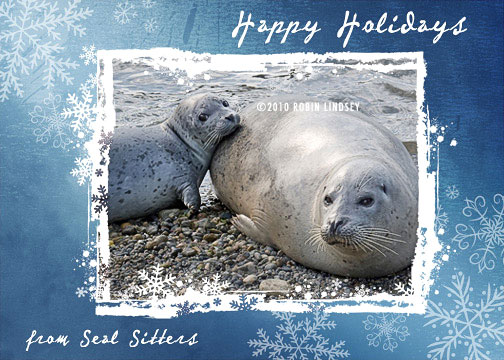Dec 2012
West Seattle's winter seal festival continues
Dec/29/12 08:22 AM
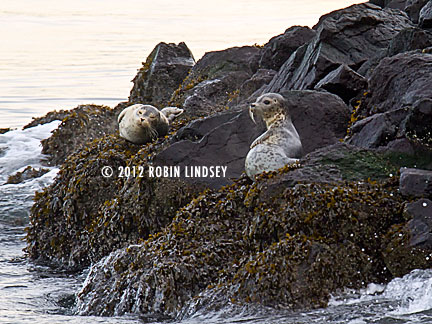
Considered an animal at the top of the food chain, harbor seals are also prey animals (sharks, transient orcas). As seal pups get older, they become increasingly aware of their surroundings. With excellent hearing, even people talking quietly nearby can cause undue stress or cause them to abandon the shoreline and unnecessarily expend energy back in the water. This is why NOAA recommends a minimum 100 yard distance when observing marine mammals. However, in an urban environment that is not always possible. Seal Sitters makes every effort to give harbor seals (and sea lions) the space they need to rest on shore, yet not terribly inconveniencing the public - a real challenge in a major metropolitan area. Many of the pups at Jack Block, an estimated 4-6 months old, are less than 75 feet from viewing areas. Some of the pups are thriving and others are struggling with respiratory issues and low body weight. All need to rest and warm up.
Surprise present for the holidays - a sea lion
Dec/29/12 08:00 AM
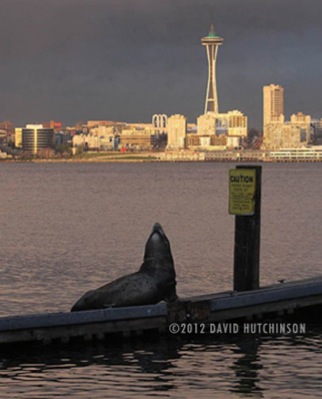
However, late Thursday afternoon the report of a sea lion hauled out on the Don Armeni boat launch dock turned out to indeed be a California sea lion. An adult male with a prominent forehead “bump” (known as a sagittal crest and indicating a sexually mature male animal) was stretched out midway down the dock. Volunteers blocked off access with sandwich boards, cones and tape. Health assessment photos were taken and sent to WDFW’s marine mammal biologist to determine if the animal had health issues or was merely seeking a convenient place to rest - well, not so convenient for those wanting to use the dock, but luckily there was virtually no boat traffic.
The sea lion spent the night on the dock under the watchful eye of volunteers and returned to the water at 8am Friday. The consulting biologist reports the sea lion appears to have swollen lymph glands or a neck abscess.
California sea lions can reach 8 feet in length and weigh up to 850 lbs. They are very mobile on land and can be dangerous if approached or harassed. Always keep your distance. Like harbor seals, they need to rest a good portion of their day. The buoys in Elliott Bay are packed with CA sea lions (and sometimes a huge Steller or two). It could be that this older sea lion with a possible injury needed refuge from the jostling and barking of sea lions on the buoys.
A young, alert harbor seal pup hauled out on the dock opposite the sea lion about 7 Thursday night, and volunteers educated the public about the difference in species. The pup returned to Elliott Bay early the next morning.
At a small cove just north of Salty’s restaurant, yet another seal pup rested from midday til late that night.
At Jack Block Park, we had a bounty of seal pups using protected areas.
No Christmas break for region's stranding network volunteers
Dec/25/12 08:50 PM
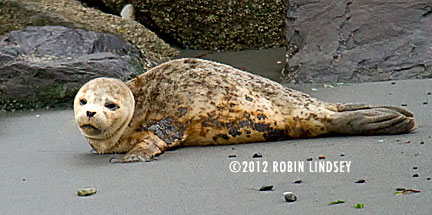
At 5:30 am, Seal Sitters’ lead investigator Robin was checking beaches for resting seal pups and found a tiny pup sleeping on the beach at Duwamish Head. She established a tape perimeter and was joined by early bird volunteer Lars. By 6:50 there was enough light to determine that it was Cookie, the pup we observed on the 23rd and feared might be injured. After consulting with WDFW Marine Mammal biologist Dyanna Lambourn (who had reviewed photos of the pup the night before), it appeared that what looks like a bloody injury is more likely creosote on the coat. Removal of creosote from the fur is very difficult and this type of human handling can be stressful on a struggling seal pup. About 9am the pup moved with good mobility from the base of the beach stairs down to the water’s edge and returned to the Sound shortly after.
Less than an hour later, the day’s hotline operator Sharon was taking a walk along Alki Beach with her husband and noticed a small pup coming ashore. First responder David and volunteer Crystal quickly taped off a buffer zone around the pup at each end of the beach and restricted access to the sea wall so people could not stand directly above the pup. Cookie had moved southwest! Volunteers were lined up in shifts to talk to rapt observers. Many thanks to Lars, Staci, Betsy, Lynn, Liz, Sharon, Crystal, Julia, Nina, David and Eilene who stood watch on what began as a relatively beautiful day, but turned into bitter cold and wet duty. Special thanks to volunteer scheduler Connie. Cookie was still on the beach as darkness fell.
As late as 10:40 pm, David and Eilene checked on the pup who was still sleeping peacefully, but was staying close to the receding tideline. At 6 am this morning, Robin and volunteer Billy searched Alki, but Cookie was not on the beach and was not seen today.
In addition to Cookie at Alki Beach, 8 seals rested at Jack Block Park yesterday and were monitored by Seal Sitters’ volunteers. The seals were inaccessible. Among those seals was Sugarplum, first observed on the park’s public access beach last week. Port Police has temporarily closed the beach.
Late afternoon on Christmas Eve, Seal Sitters received an email about a dead porpoise at Shoreline’s Richmond Beach (not in Seal Sitters MMSN jurisdiction). We contacted Sno-King Marine Mammal Response whose lead investigator Rachel Mayer searched the beach in the rain late last night, found and secured the animal so it would not disappear with the tide. Today, WDFW’s Dyanna Lambourn with kids and husband in tow picked up the dead porpoise (it will be necropsied to determine cause of death) on the way to her mother’s house for Christmas dinner.
We want to wish all of our fellow dedicated NOAA Marine Mammal Stranding Network volunteers throughout the Northwest a happy holiday season and know that many sacrificed their Christmas celebrations to respond to animals in need - just as we all do every single day of the year, rain or shine.
Potentially injured pup hauls out on Alki steps
Dec/23/12 11:37 PM
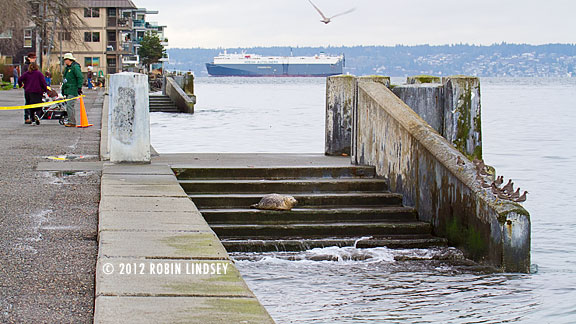
Yesterday afternoon, a report of a pup on the steps at Alki Beach was phoned in to Seal Sitters hotline. Responders were on the scene within minutes to find a small pup resting just below the promenade across from Cactus restaurant. Volunteers quickly set a perimeter and observed the animal while talking to passersby. The sweet little pup, nicknamed Cookie, rested long enough for people to get a great view and learn a bit about seal behavior and biology. Pups often use the steps as a haul out site when the tide is high and there’s no exposed beach to use.
Two people came up and showed photos taken earlier of the pup coming up the steps. They were worried that there appeared to be a possible wound on the left side (hidden from our view of the resting pup). Indeed the photos raised that possibility. We attempted to get a closer look from the opposite side, but the pup returned to the water minutes later and we could not get a clear shot.
Late that afternoon as darkness fell, Cookie hauled out again at the tideline. In the darkness we could hear the pup coughing and rasping - not a good sign. Almost all pups have some kind of respiratory issues this time of year, some worse than others.
Volunteers were out before sunrise this morning looking for the pup along the promenade, checking each set of steps leading down to the beach. Cookie could not be found. Upon examining our photos, we discovered the pup might have some lacerations. Had photos been downloaded and examined on site, we would have been able to see these possible wounds in the pup’s mottled coat. Due to weight, costly replacement value and challenging conditions, our first responders do not generally take their laptops into the field. An iPad would have enabled us to quickly examine high resolution photos on site and if the pup was indeed wounded, we might have been able to capture the seal pup, do a health assessment and get him medical attention if necessary (though his proximity to the water would have made it difficult). If you have an iPad you would like to donate to our work, please contact us or if you’d like to donate funds to enable us to purchase one, please visit our donation page. We have sent photos to WDFW Marine Mammal Investigations’ biologist to determine if the pups has wounds .
We will be vigilantly looking for Cookie. Please, call our hotline immediately if you see a pup on the beach: 206-905-7325 (SEAL).
PUPDATE 12/24 a.m.
Cookie was found resting on a nearby beach before dawn and returned to the water at daybreak, just as we managed to id him. We have still not been able to determine if the pup is injured, but he seemed to move well across the beach. It is also reassuring that he had no coughing spells today.
Wave of chubby pups best holiday gift of all for volunteers
Dec/21/12 09:57 PM
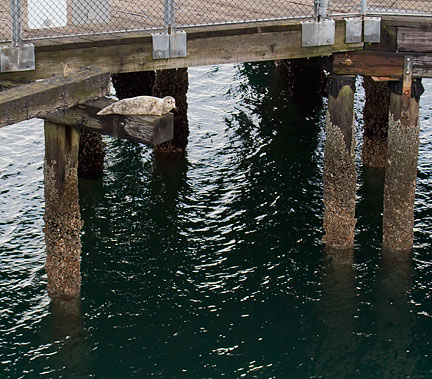
This past week has seen an increase in pups using Elliott Bay beaches and man-made structures, with volunteers monitoring pups in multiple locations. December storms and unusually high tides have encouraged pups to haul out wherever they can find an accessible resting spot. At Jack Block Park, the public pier has been partially submerged at high tide and pups have been crawling onto the support timbers. As the tide recedes, it is an unnerving sight to see a pup resting 10 feet above the Bay. In order to assure the safety of the pups, we have taped off the entrance to the pier when pups are hauled out, but onlookers have a great view of both the pups and the Seattle skyline from the handicap-friendly walk and tower above.
The Port Police has temporarily closed the public access beach for protection of the marine mammals from off leash dogs and curious people. We are so grateful for their support!
We have also responded to seals in several other locations this past week, keeping first responders and volunteers very busy in this wet and windy weather.
Pup takes a snooze at Crowley Marine
Dec/19/12 09:45 PM
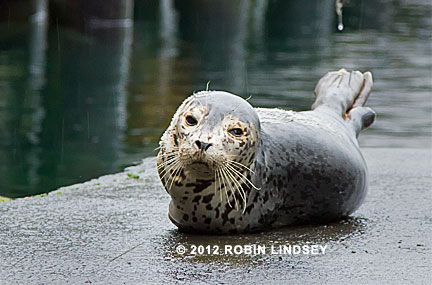
First responders observed the pup for a short time to ensure that there were no obvious health issues, such as coughing or discharge, or wounds. Crowley settled in for a long snooze under the watchful eye of employees. Thanks to Rick for giving us a call.
New study reveals seal pups learn foraging skills at early age
Dec/19/12 10:17 AM
SeaDoc Society has just released the findings of a study of 20 satellite tagged weaned harbor seal pups, half of whom were tagged in the wild and half after rehabilitation. The study shows that rehabbed pups travel greater distances than wild pups foraging for food. Read this fascinating story here.
West Seattle stranded seal pup Sandy was satellite tagged and released in late January this year after a lengthy rehab at PAWS. Hundreds of people logged onto SeaDoc’s site and followed her progress and travels around Puget Sound until she was found dead in April, entangled in derelict fishing gear. Her death put a face on the dangers of marine debris and pollution and a beach cleanup was held in her honor. Read about Sandy here.
West Seattle stranded seal pup Sandy was satellite tagged and released in late January this year after a lengthy rehab at PAWS. Hundreds of people logged onto SeaDoc’s site and followed her progress and travels around Puget Sound until she was found dead in April, entangled in derelict fishing gear. Her death put a face on the dangers of marine debris and pollution and a beach cleanup was held in her honor. Read about Sandy here.
Winter cold brings seal flurries to Elliott Bay
Dec/18/12 08:07 AM
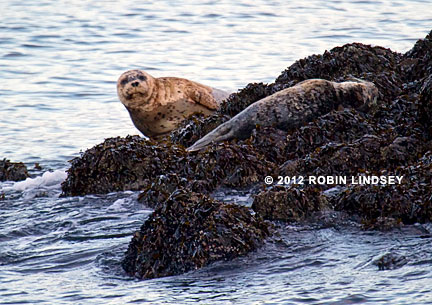
There was a flurry of seal activity around Jack Block Park all day, just as there has been over the past couple of weeks. At one point yesterday, we had 4 seals on shore, including the adult and pup shown above (who were inaccessible to people). Even though those seals on the rocks were safe from people and dogs, they were still close enough that the public could disrupt their rest. It is doubtful that the adult is the mother of the pup, as pups are weaned at 4-6 weeks old and are then on their own with no support from mom. However, since pupping season in the Hood Canal runs as late as October, there is an outside chance that a pup could still be hanging out with mom in mid-December. More likely, there is a bounty of food right now in Elliott Bay which is attracting both pups and adults to forage and then share the shore to rest and warm up.
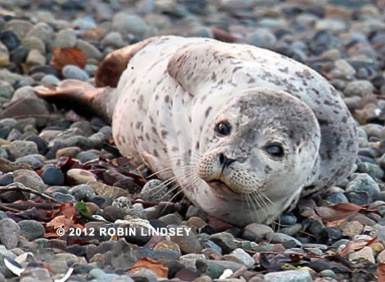
December brings Noel and more seal pup joy
Dec/14/12 05:37 AM
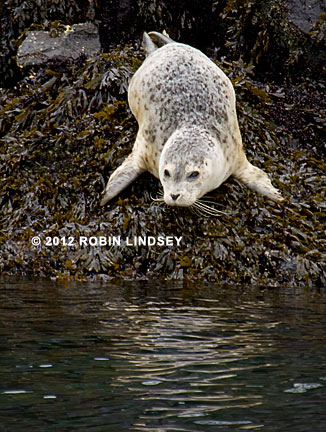
Noel was first observed in the rain on Tuesday after the hotline received a call. Noel seems to be having success foraging, but did have some coughing spells that first day. Volunteers have not noticed any coughing since then, so it is our fervent hope that he does not have any respiratory issues.
As our responder stood on the pier observing Noel that first day, she noticed another pup sleeping and drifting carefree in the water just a few feet away. A darker pup, she wondered if it could be Sealy Dan, the hitchhiking pinniped, but spot comparisons in photos show it is not. So, we have lots of little seal visitors in our waters to look after.
Thin pup finds a safe resting place
Dec/07/12 09:13 PM
A tape perimeter was established to prevent people from standing above the pup on the sea wall or entering the small beach. On a rather bitter day, cold volunteers watched over the pup until he returned to Puget Sound around 4:30 in the afternoon - a good, long rest.
Nicknamed Stoney, he was definitely too skinny and appears to have some respiratory issues. As pups lose weight and their immune system is suppressed, they are much more vulnerable to parasitic and viral infections. He slept soundly all day except when the noise from a large truck on Alki Avenue startled him. It was an encouraging sign that once Stoney decided it was time to head back out to forage, he moved rather quickly across the beach down to the water’s edge. Hopefully, he had a substantial dinner of tiny fish, shrimp and squid.
The video clip is a good example of harbor seal locomotion. Unlike sea lions who can rotate their rear flippers forward to walk on land, harbor seals can only use their small front flippers as they flop-hop in a caterpillar motion. You can see how difficult it would be for a seal pup to escape from a predator (or curious people and dogs) while on shore. We didn’t see Stoney today, but will be on the lookout for him tomorrow.
Seal Sitters awarded matching fund grant
Dec/05/12 06:53 AM
Seal Sitters is elated to announce that we have been awarded a Department of Neighborhood (DON) grant for our proposed educational outreach project, 2013: The Year of the Seal. The Neighborhood Matching Fund program awards are “matched” by volunteer labor, donated materials, donated professional services or cash. Seal Sitters volunteers will be donating many, many hours to this project, far exceeding the required match in volunteer hours, but will need to fundraise additional monies. Community involvement and mobilization will include art and essay participation by local students, culminated with the installation of a bronze sculpture of a mother seal and pup.
The most abundant marine mammals in Puget Sound, harbor seals are the ones the general public is most likely to encounter on our shores. Seal Sitters uses the image of a harbor seal pup as the “ambassador” for the marine life of Elliott Bay and Puget Sound. Harbor seals do not migrate and are year-round residents of our Salish Sea. They are considered by biologists to be an indicator species of the health of our waters. In fact, a 2005 study showed that the harbor seals of South Puget Sound were 7 times more contaminated with pollutants than those in Canada’s nearby Strait of Georgia (read more about the effects of marine pollution on our website). We, therefore, consider this species to represent the concerns we all have for preserving our natural world.
This outreach project will serve to remind us that ours is a fragile ecosystem. It will raise community consciousness about the importance of protecting our marine environment - and that of all marine life, including shorebirds, that call Puget Sound home. It will provide a unique educational message that our urban shores are home to many other species - and a reminder to “Share the Shore” with wildlife.
This will be the third DON grant awarded to Seal Sitters for educational outreach projects, including a public service announcement, street banners which are displayed along Alki Avenue during pupping season and informational beach signage. Read about these earlier accomplishments here. Thanks to DON for such amazing support and belief in our projects.
None of the funds from these matching fund grants cover Seal Sitters’ operating expenses. We receive no funding from NOAA, the State or the City of Seattle for our on-going expenses, such as dedicated hotline, web and blog costs, gas for first responders and stranding, training and educational materials. If you would like to donate to help defray these costs, please click here.
Seal Sitters is currently in conversations with Seattle Parks regarding details of the project. We should be able to give a full report on the project in the next couple of weeks.
The most abundant marine mammals in Puget Sound, harbor seals are the ones the general public is most likely to encounter on our shores. Seal Sitters uses the image of a harbor seal pup as the “ambassador” for the marine life of Elliott Bay and Puget Sound. Harbor seals do not migrate and are year-round residents of our Salish Sea. They are considered by biologists to be an indicator species of the health of our waters. In fact, a 2005 study showed that the harbor seals of South Puget Sound were 7 times more contaminated with pollutants than those in Canada’s nearby Strait of Georgia (read more about the effects of marine pollution on our website). We, therefore, consider this species to represent the concerns we all have for preserving our natural world.
This outreach project will serve to remind us that ours is a fragile ecosystem. It will raise community consciousness about the importance of protecting our marine environment - and that of all marine life, including shorebirds, that call Puget Sound home. It will provide a unique educational message that our urban shores are home to many other species - and a reminder to “Share the Shore” with wildlife.
This will be the third DON grant awarded to Seal Sitters for educational outreach projects, including a public service announcement, street banners which are displayed along Alki Avenue during pupping season and informational beach signage. Read about these earlier accomplishments here. Thanks to DON for such amazing support and belief in our projects.
None of the funds from these matching fund grants cover Seal Sitters’ operating expenses. We receive no funding from NOAA, the State or the City of Seattle for our on-going expenses, such as dedicated hotline, web and blog costs, gas for first responders and stranding, training and educational materials. If you would like to donate to help defray these costs, please click here.
Seal Sitters is currently in conversations with Seattle Parks regarding details of the project. We should be able to give a full report on the project in the next couple of weeks.
"Injured" Harbor Island seal pup appears to be fine
Dec/04/12 10:13 PM
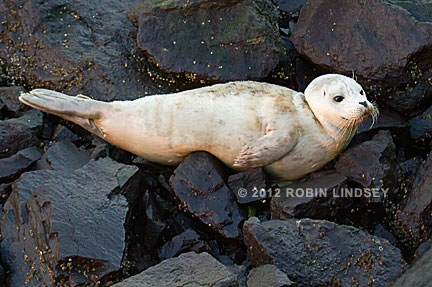
Our responders arrived on the scene prepared to do a possible capture and transport of the animal for treatment. Instead, though, we found a seemingly healthy and alert pup resting below a pier, dwarfed beside the US Coast Guard’s moored heavy icebreaker ship, the Polar Star.
Nicknamed Charlie by dock workers, the pup has been hanging around the floating docks near the pier for some time now. The noisy activity of people and machinery don’t seem to phase him too much. However, when the pup unexpectedly showed up on shore today, his slow maneuvering across the rocks seemed worrisome to some. We observed Charlie’s behavior for quite some time, but could see nothing unusual. With short little front flippers and rear ones that don’t rotate forward for locomotion, moving up from the water across large jagged rocks is not the easiest task for a seal pup. It was difficult to judge body weight because of his position on the rocks, but his eyes and nostrils were clear - a good sign! As we left the shipyard, we distributed our contact information among workers in case any other concerns arose.
Leopard and Silkie named outstanding science trade book winner
Dec/03/12 11:53 PM
Leopard and Silkie, One Boy’s Quest to Save the Seal Pups (Henry Holt Books for Young Readers), text by Brenda Peterson and photographs by Robin Lindsey, has been named a winning title in the top science trade books for K-12 by the National Science Teachers Association. The co-authors are founding members of Seal Sitters. The book (ages 4 and up) is based on the true story of two seal pups who befriended each other on the shores of West Seattle in 2007, woven into a tale about young volunteers who protect them.
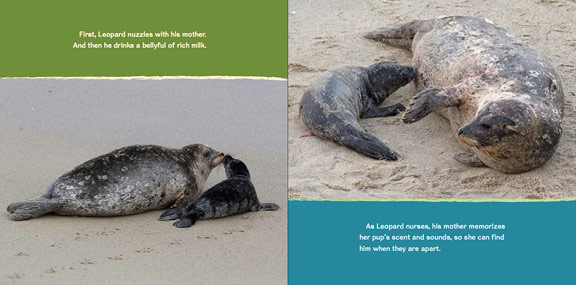
“In the Pacific Northwest, concerned volunteers become Seal Sitters, keeping vigil over the vulnerable seal pups who rest on our shores. Miles, a young volunteer, is particularly concerned about the seals. He sets out to help them in his own special way.
Surviving in the animal kingdom is never easy, and this informative picture book gives a first-hand look at what seal pups are up against. With its emphasis on human compassion and assistance, this story teaches children to appreciate the natural world by helping protect seal pups.”
An Early Reader edition of the story titled Seal Pup Rescue is due out soon. The authors are thrilled that now libraries, teachers and students all over the country will know about Seal Sitters and, hopefully, inspire young people to make a difference. This may save the lives of many young seal pups on every coastline. Please visit www.leopardandsilkie.com to learn more about the backstory of the book.

“In the Pacific Northwest, concerned volunteers become Seal Sitters, keeping vigil over the vulnerable seal pups who rest on our shores. Miles, a young volunteer, is particularly concerned about the seals. He sets out to help them in his own special way.
Surviving in the animal kingdom is never easy, and this informative picture book gives a first-hand look at what seal pups are up against. With its emphasis on human compassion and assistance, this story teaches children to appreciate the natural world by helping protect seal pups.”
An Early Reader edition of the story titled Seal Pup Rescue is due out soon. The authors are thrilled that now libraries, teachers and students all over the country will know about Seal Sitters and, hopefully, inspire young people to make a difference. This may save the lives of many young seal pups on every coastline. Please visit www.leopardandsilkie.com to learn more about the backstory of the book.
